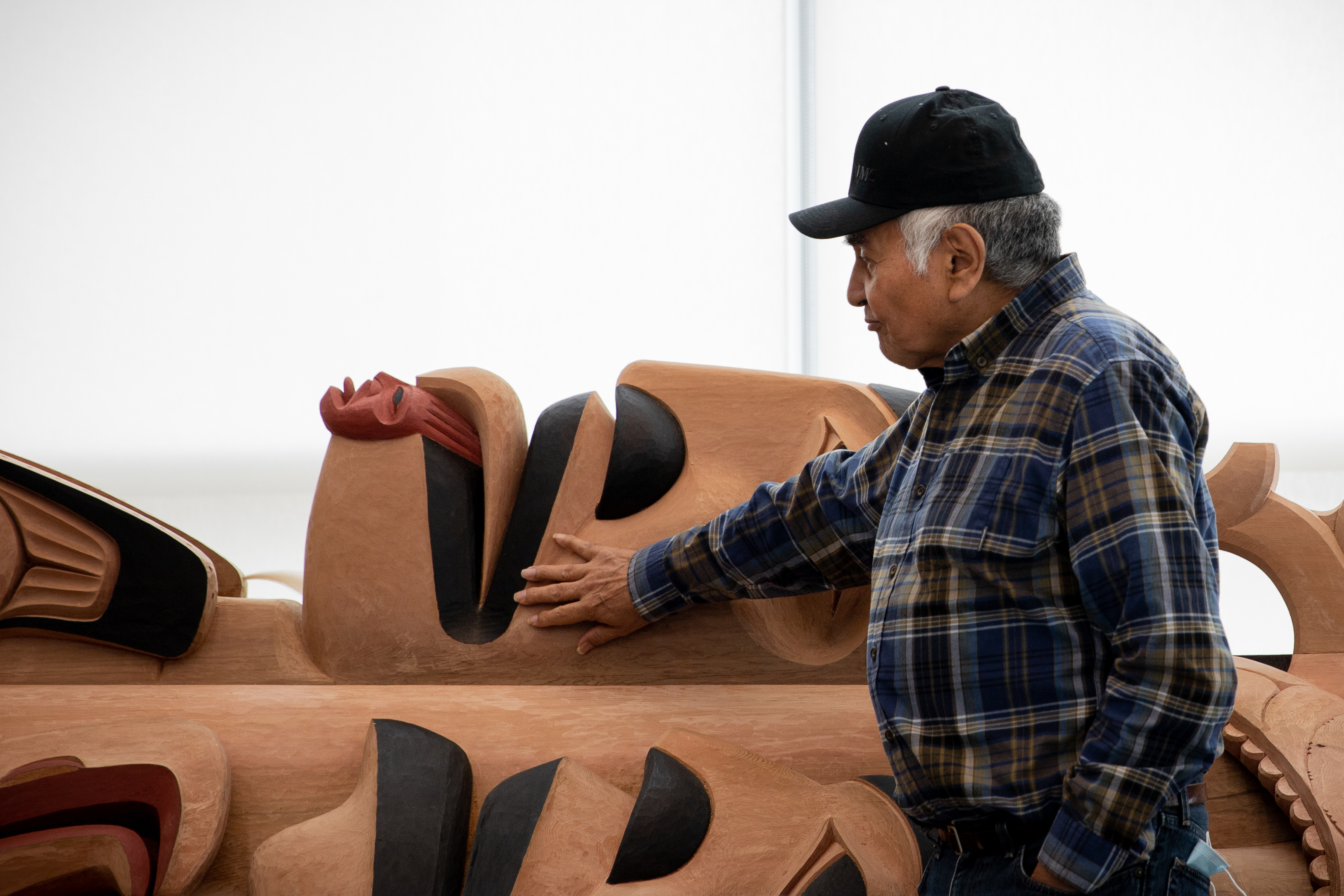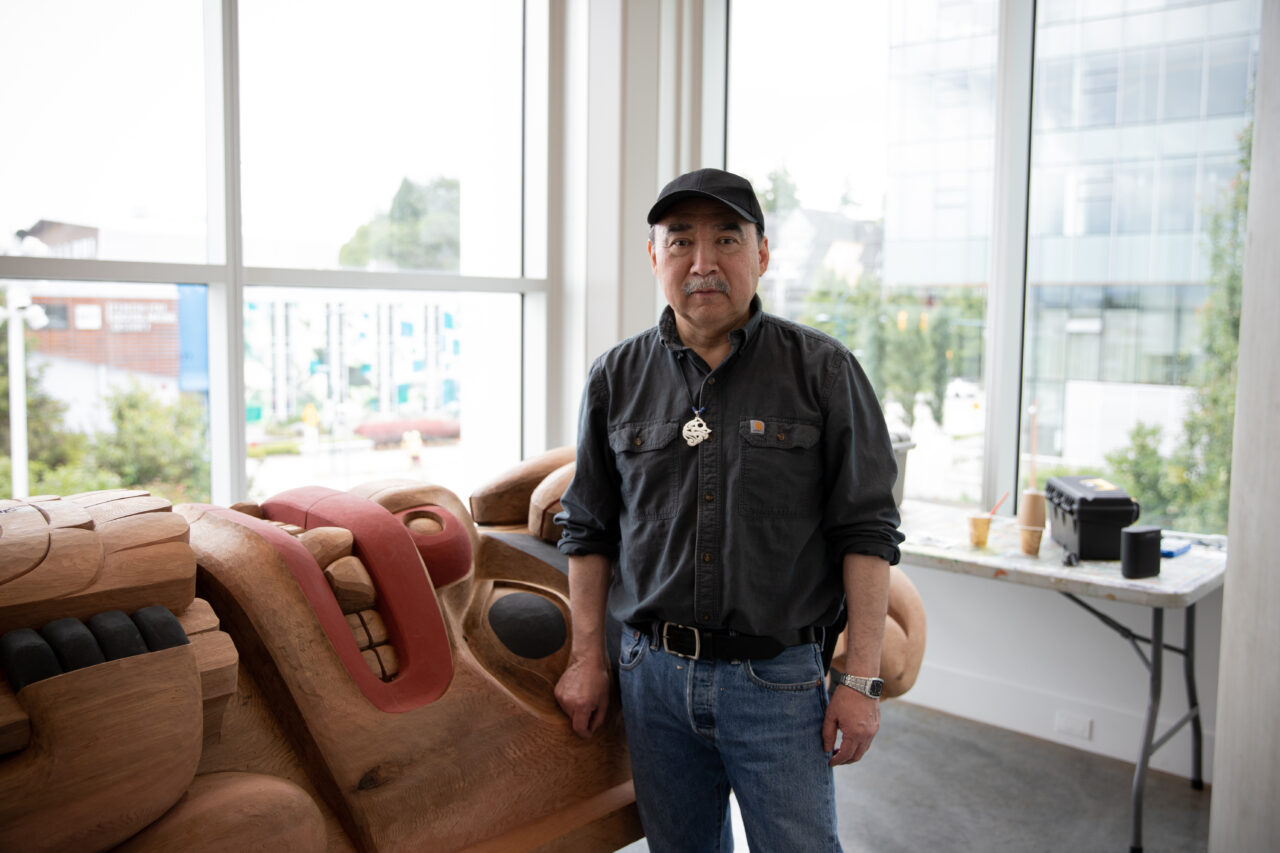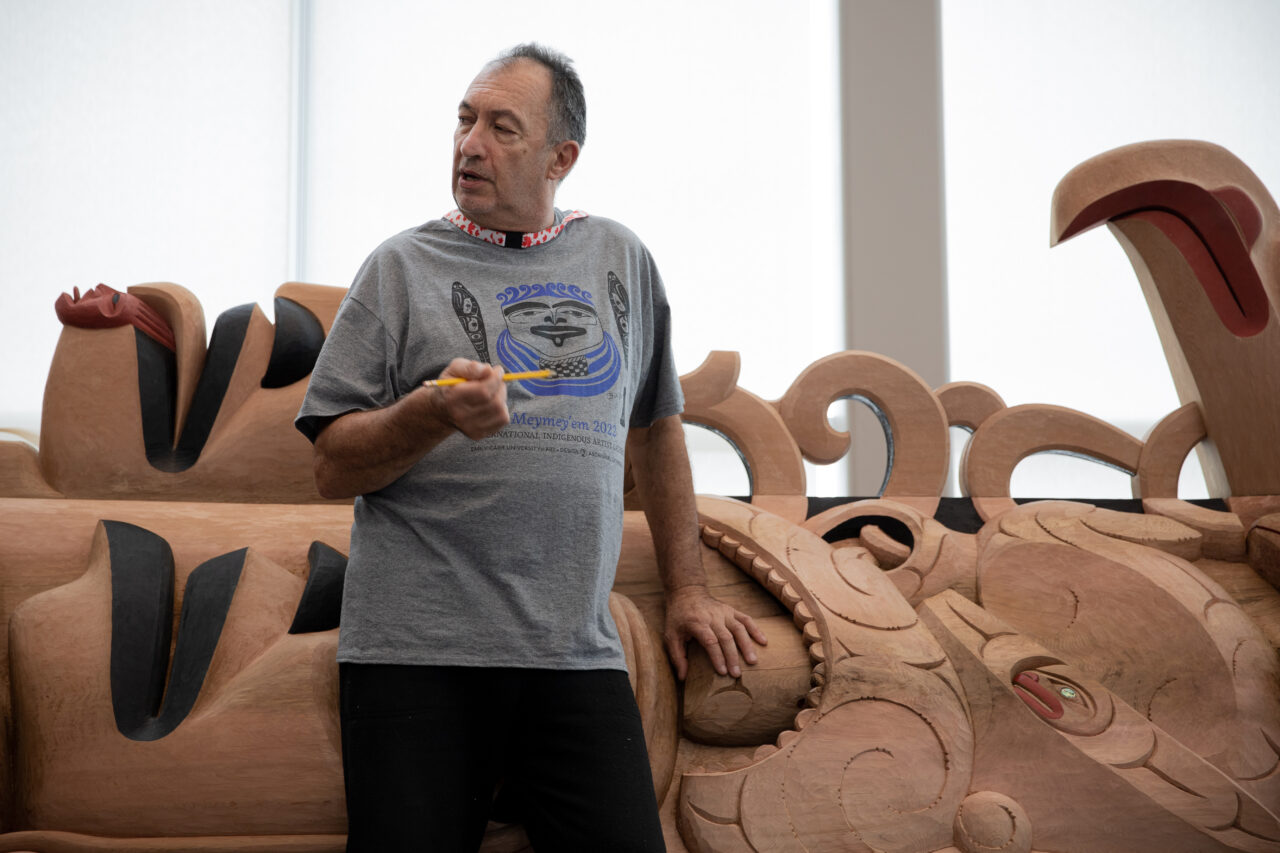New Totem Pole at Emily Carr University Embodies Community Connections

Master Carver Dempsey Bob with the Pacific Song of the Ancestors totem pole at Emily Carr University. (Photo by Perrin Grauer)
Posted on
ECU invites the public to experience a breathtaking new art installation by Master Carvers Dempsey Bob, Stan Bevan and Lyonel Grant, now part of ECU’s permanent collection.
In recognition of the National Day for Truth and Reconciliation, the Pacific Song of the Ancestors totem pole and accompanying exhibition articulating the pole’s journey will be open to the public on Sept. 29, 2023, from 7:30 a.m. to 8 p.m.
“This whole project is about community, communication and respect for Indigenous art, education and culture,” says Brenda Crabtree, the recently retired Director of Aboriginal Programs and Special Advisor to the President on Indigenous Initiatives at Emily Carr University. “The artists will tell you this is the most sculptural pole they’ve ever created—a refined work of art. For Emily Carr University to house this masterpiece that will inspire the public and generations of students, well, it’s simply priceless.”
The collaborative work by Master Carvers Dempsey Bob (Tahltan-Tlingit), Stan Bevan (Tahltan-Tlingit and Tsimshian) and Lyonel Grant (Māori and Pakeha) began nearly a decade ago and embodies the spirit of community building, Indigenous interrelationships and reverence for the diverse Indigenous cultures within B.C. and beyond.
The project is rooted in a longstanding connection between the Aboriginal Gathering Place (AGP) at Emily Carr University and communities in northern B.C. that began when Brenda Crabtree oversaw the creation of an articulation agreement with the Freda Diesing School of Northwest Coast Art. This agreement allows Indigenous students to ladder into a degree program at ECU — Canada’s top-ranked school for art and design and one of the best worldwide.

Master Carver Stan Bevan with the Pacific Song of the Ancestors totem pole at Emily Carr University. (Photo by Perrin Grauer)
Along with artist Ken McNeil (Tahltan-Tlingit and Nisga’a), Dempsey Bob and Stan Bevan founded the Freda Diesing School in 2006. They named the school after Dempsey’s late mentor, Haida artist Freda Diesing, who studied at ECU (then the Vancouver School of Art). Bob envisioned the ‘Pacific Song of the Ancestors’ totem pole as both a tribute to Freda and a way to honour ECU and the AGP’s ongoing commitment to outreach work in rural and remote areas of British Columbia.
“The AGP at Emily Carr has always focused on celebrating the diversity of our Indigenous students, faculty and staff,” says Crabtree. “We honour and respect the local Host Nations, and we acknowledge that most of our Indigenous students come from all around B.C. and other provinces. We don’t often see Tahltan-Tlingit art in Vancouver, so for me, this project is about connecting with Indigenous artists from other communities, learning about and honouring their artistic traditions, and providing an opportunity for the public to experience this diversity.”
The 25-foot, 2,600-pound pole was primarily carved in Bevan’s studio in Terrace, B.C. with contributions from local carvers and students from the Freda Diesing School, who worked as apprentices. When the COVID-19 pandemic hit, Bob and Bevan intensified their focus on the pole. Crabtree surmises this newly found time to “hover” and develop the project led to the pole’s exceptional refinement and superb sculptural character.
In the summer of 2021, the pole was transported to Emily Carr University and craned up to the main floor where it lay covered at the AGP. The following summer in 2022, Bob and Bevan worked to complete the pole alongside visiting artist Lyonel Grant from New Zealand.

Master Carver Lyonel Grant with the Pacific Song of the Ancestors totem pole at Emily Carr University. (Photo by Perrin Grauer)
“The Māori’s culture is so similar to ours, with their weavers, carvers, dancers, singers, longhouses and canoe culture,” Dempsey Bob says in a statement about the project. “The pole, which tells the migration story of the wolves, eagles and grizzly bears, exemplifies the cultural relevance of movement, migration, exploration and our connection to our land. The movement of the figures points to this southward migration, with the eagle and wolf heads protruding downward, out of the traditional totem pole into a sculptural expression. The deeper carvings, the projected figures and the flowing hair make this work come to life.”
The totem pole has been installed in the northwest corner of the ECU campus building outside the Reliance Theatre. On Sept. 28, it will be unveiled during a cultural ceremony with representatives from the three artists’ Nations as well as local Host Nations.
The public is invited to view the totem pole on Sept. 29 as an activity leading up to the National Day for Truth and Reconciliation. As part of Emily Carr University's permanent art collection, the totem pole will be on display from Sept. 29 onward. The accompanying exhibition will be on view through Sept. 29. Attendance is free and open to the public.
Visit the AGP online to learn more about their programming and opportunities.